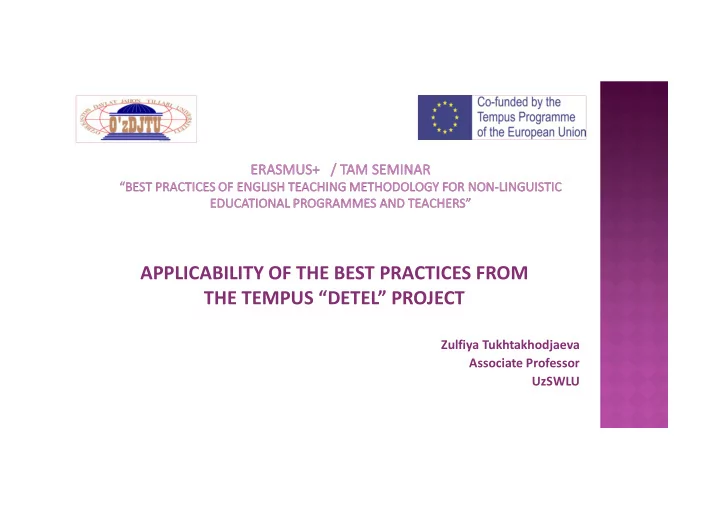

APPLICABILITY OF THE BEST PRACTICES FROM THE TEMPUS “DETEL” PROJECT Zulfiya Tukhtakhodjaeva Associate Professor UzSWLU
«Developing the Teaching of European Languages: Modernising Language Teaching through the development of blended Master’s Programmes - DeTEL» Duration - 3 years: Dec 2013 – Dec 2016 Overall coordination: Aston University, Birmingham, United Kingdom and Tyumen University, Russia
➢ Aston University (Birmingham, UK), the Project Coordinator and grant holder ➢ Freiburg University of Education (Freiburg, Germany) ➢ University of Caen Basse-Normandie (Caen, France)
➢ Tyumen State University (Russia) ➢ Yaroslavl State Pedagogical University (Russia) ➢ Voronezh State University (Russia) ➢ Kyiv National Linguistic University (Ukraine) ➢ Mykolayiv National University (Ukraine) ➢ Samarkand State Institute of Foreign Languages (Uzbekistan) ➢ Uzbekistan State University of World Languages
Stage 1: Information-gathering for needs analysis to prepare content-based master’s programme Stage 2: Retraining teachers/tutors in PC HEIs to enable them develop and deliver blended master’s programme Stage 3: Development of modules of a new Master’s programme in European Languages’ Teaching and experimental piloting
Set up a Project Working group of 10 FLTT specialists; Collected data on current policy and practice for language teacher education in Uzbekistan; Conducted survey among local FL teachers and needs analysis for upgrading FLTT; Collected data on good practice through visits to AU, UC and FUE Participated in ToT trainings in AU, UC and FUE; Set up international teams of module developers from partner HEIs; Agreed on the new curriculum for FLTT and contents of the modules; Developed and shared the modules and resources among partners; Selected, approved and uploaded module materials to the MOODLE VLE; Continuing to upgrade course materials and resources on the e-platform.
Speciality courses Modern trends in Linguistics Text Linguistics / Discourse analysis Foreign linguistic conceptions Modern trends in comparative linguistics Practical course in English/German/French Optional courses Methodology of teaching special courses Topical problems in linguocultural studies Innovative technologies in learning a foreign language Scientific research Research and Master’s thesis Scientific-pedagogical practicum
1. Course design and evaluation 2. Age Appropriate Language Pedagogy 3. Technology and Language Learning 4. Foreign Language Teaching Methodology 5. English Language Improvement 6. German Language Improvement 7. French Language Improvement
Integration of theory and practice Learner-centeredness Research-based learning Task-based approach International standards for FL teachers training taken into consideration Each module consisting of 12 lessons Each lesson is worked out in the blended learning format in proportion of 40% for face-to-face and 60% for on-line learning
Flexibility of the subject matters and needs; Adequacy of methods, techniques, strategies and teaching aids; Succession of teaching material; Variety of activities; Educational value; Appropriateness to the context; Accessibility; Balance of vocational skills and tasks; Clarity of instructions, etc.
Methods of teaching and learning methods – task-based, problem-oriented, CLIL, reflexive, action research, experience-based, module training; activities – presentations, discussions, case-study, projects, surveys, summaries, lesson design, micro teaching, etc. Methods of assessment formative and summative assessment (quizzes and tests, reflexive essays for self-assessment, peer-assessment and experts’ comments in panel discussions, exams, etc.).
Piloting 2 modules – “English Language Improvement” and “Technology in Language Teaching” in the experimental group of 20 students at MA course; Revising curriculum, syllabi and online materials on the basis of feedback from students and module developers’ teams; Hosting of EU and HEIs staff to co-pilot the modules; Assessing of piloting results and upgrading the modules; Preparing for the piloting of other 5 modules in the 2 nd semester of this academic year; Considering new project initiatives related to cascading and joint MA degree
“EAP … employs a range of interdisciplinary influences for its research method, theories and practices to provide insights into the structures and meanings of spoken, written, visual and electronic academic texts, into the demands placed by academic contexts and communicative behaviours, and into the pedagogic practices by which these behaviours can be developed’ (Ken Hyland, English for Academic Purposes.- Routledge, 2006, p.2)
DeTEL modules through EAP perspectives: C1 competence based learning in language teaching; using advanced teaching methodology; mastering classroom language; continuous assessing of language skills and needs analysis; teaching course design and evaluation; providing discourse analysis; developing student writing in various research genres; developing communication skills at all academic levels; fostering internationalisation of the MA programme, etc. (http://www.journals.elsevier.com/journal-of-english-for-academic-purposes/)
Contacts: malika0777@mail.ru Project Website: www.aston.ac.uk/lss/research/research- projects/project-tempus/
Recommend
More recommend